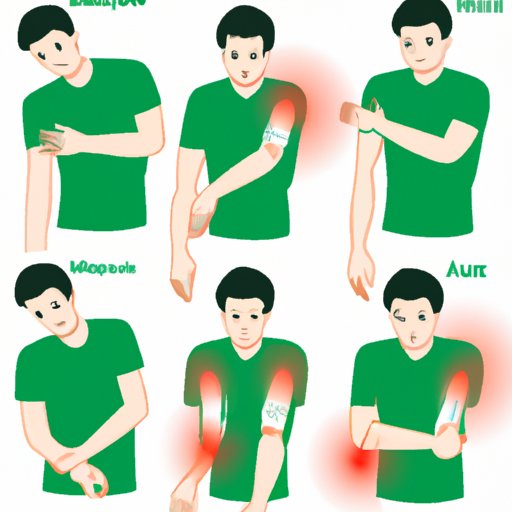
Introduction to Myopathy
If you’ve ever experienced muscle weakness or pain, it may be due to a condition called myopathy. Myopathy is a collection of disorders that affect the muscles and can result in a wide range of symptoms. There are many potential causes of myopathy, including genetic factors, autoimmune diseases, and certain medications or infections. In this article, we’ll explore the symptoms of myopathy in depth, including how to recognize them, what to do if you suspect you have myopathy, and techniques for managing your symptoms and improving your quality of life.

Exploring the Symptoms of Myopathy: What You Need to Know
The symptoms of myopathy can be somewhat similar to those of other muscular disorders. However, myopathy is characterized by a specific set of symptoms that distinguish it from other conditions. For example, muscle pain is a common symptom of many different disorders, but in myopathy, the pain may be accompanied by other specific symptoms, such as muscle weakness or fatigue.
Myopathy Symptoms: How to Recognize the Warning Signs
One of the most common symptoms of myopathy is muscle weakness, which can progress over time. Typically, muscle weakness begins in the proximal muscles, or those that are closest to the torso. Other common symptoms of myopathy include muscle cramps or stiffness, fatigue, and difficulty standing up from a seated position. Individuals with myopathy may also experience difficulty swallowing or breathing, depending on the severity of the disorder.
Myopathy symptoms can vary depending on the type of myopathy an individual has. For example, some types of myopathy primarily affect the heart, while others may affect only certain types of muscle fibers. Additionally, some types of myopathy are more common in children or in certain ethnic groups. If you suspect you have myopathy, it’s important to speak with your doctor or an experienced medical professional to determine the exact cause of your symptoms.
The Top 5 Symptoms of Myopathy You Shouldn’t Ignore
While there are many possible symptoms of myopathy, there are a few specific warning signs that you shouldn’t ignore. If you experience any of the following symptoms, you should speak with a medical professional as soon as possible:
- Muscle weakness that persists over time or gets worse
- Difficulty getting up from a seated position or climbing stairs
- Unexplained muscle pain or cramping
- Difficulty swallowing or breathing
- Sudden or unexplained changes in strength or coordination
If you experience any of these symptoms, it’s important to seek medical attention. Myopathy can be a serious condition, and early detection and treatment may help to prevent further complications.
Muscle Weakness, Pain, and Fatigue: The Key Indicators of Myopathy
Muscle weakness and fatigue are two of the most common and persistent symptoms of myopathy. These symptoms can affect any muscle in the body, including those responsible for basic movements like walking, standing, and sitting. Additionally, individuals with myopathy may experience muscle pain, which can be localized or widespread. Pain may worsen with movement or exertion, and may be accompanied by muscle tenderness.
Individuals with myopathy may also experience fatigue, which can make it difficult to perform everyday tasks. Fatigue can be a sign that the muscles are not getting the oxygen and nutrients they need to function properly, and may be accompanied by other symptoms such as dizziness or difficulty concentrating.
Navigating the Symptoms of Myopathy: A Comprehensive Guide
If you’ve been diagnosed with myopathy, you may be wondering how to manage your symptoms and improve your quality of life. There are many strategies that can be effective in reducing the severity of myopathy symptoms, including:
- Regular exercise (under the guidance of a medical professional)
- Dietary changes or supplements
- Physical therapy or occupational therapy
- Stress reduction techniques, such as meditation or yoga
It’s important to work with your medical team to develop a comprehensive treatment plan that addresses both the physical and emotional aspects of myopathy. Additionally, reaching out to support groups or other individuals who have experienced similar symptoms may help to provide comfort and guidance as you navigate this new terrain.
How to Tell If You Have Myopathy: Understanding the Signs
Diagnosing myopathy typically involves a number of medical tests and exams. Your doctor may begin by conducting a thorough physical exam and reviewing your medical history and symptoms. Additionally, they may order blood tests to check for certain markers that are associated with myopathy, or may perform certain imaging tests to evaluate muscle function and structure.
Early detection and treatment of myopathy is crucial for preventing further complications. If you suspect you have myopathy, it’s important to speak with a medical professional as soon as possible.
Myopathy Symptoms and Treatment: What Every Patient Needs to Know
If you’ve been diagnosed with myopathy, you may be wondering what treatment options are available. There are many different treatments that may be effective in managing myopathy symptoms, depending on the severity and progression of your condition. Some common treatments for myopathy include:
- Medications, including anti-inflammatory drugs or immunosuppressants
- Physical therapy or occupational therapy
- Dietary changes or supplements
- Surgical interventions, in some cases
Your medical team can help you determine which treatment options are most appropriate for your individual needs and goals. Additionally, it’s important to be proactive in managing your symptoms and maintaining open communication with your medical team.
Conclusion: Finding Support and Solutions for Myopathy
Myopathy can be a difficult condition to manage, but with the right support and resources, it’s possible to live a full and rewarding life. If you suspect you have myopathy, don’t hesitate to seek medical advice and support. There are many organizations and advocacy groups that can provide information, resources, and emotional support for individuals with myopathy and their families. With the right treatment and care, you can take charge of your symptoms and continue to pursue your passions and goals.




